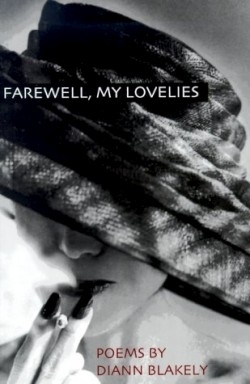Farewell, My Lovelies
Braided narratives, subtle shifts from mythical to modern times, complex
allusions to both film noir and pop culture and social consciousness
characterize this collection of poems. Braiding narratives is a stylistic
device brought to literary attention by Bridget Peggeen Kelly’s work in Goat
Song. Blakely has mastered this technique and uses it to integrate the strands
of her most fascinating pieces.
Her narratives move back and forth in time and focus, accumulating meaning by
association. For example, in “Last Dance” she begins with one of ballet’s most
famous bad women, Giselle, but moves the story briskly through furies to free
associations with Courtney Love and Kurt Cobain. This fresh replay of mythical
motif against the “Transcendent fury / thumping loud…” of contemporary pop
icons, makes for a wildly textured, but lush piece. Her poetry explores the
connection of film, particularly film noir, with the distant and sometimes
detached values that mark the end of the twentieth century.
In “Reunion Banquet, Class of ‘79,” she creates a thick soup of images by
juxtaposing cinematic titles against the moment of realizing one cannot, and
perhaps should not, look too closely at the past. “The Deer Hunter. Most seated
here are divorced, / and childless too. Lipstick. Who’ll stop the rain? / I
untie my knotted napkin, wanting out. It’s late. / Women under the influence.
Badlands.”
As well as the surreal qualities of these poems, Blakely just as easily anchors
her work in brutal reality and spiritual quandary. In her poem, “The Homeless
in America,” inspired by a photographic exhibit on that subject, she targets
the harshest of American moments. A mother and child sleeping on the streets
evolve into an urban pieta, “His hair’s caked / and matted, still she tries to
smooth it, / her cracked fingers sorting his miniature / dreadlocks and
probably finding lice.”
Blakely is a poet who drives one into the twenty-first century with an
intelligent blast without letting go of the impact and implacability of history
and the human story. Her work will please avid readers of poetry who are
looking for a fresh, complex voice and sophisticated taste.
Reviewed by
Anne-Marie Oomen
Disclosure: This article is not an endorsement, but a review. The publisher of this book provided free copies of the book to have their book reviewed by a professional reviewer. No fee was paid by the publisher for this review. Foreword Reviews only recommends books that we love. Foreword Magazine, Inc. is disclosing this in accordance with the Federal Trade Commission’s 16 CFR, Part 255.

